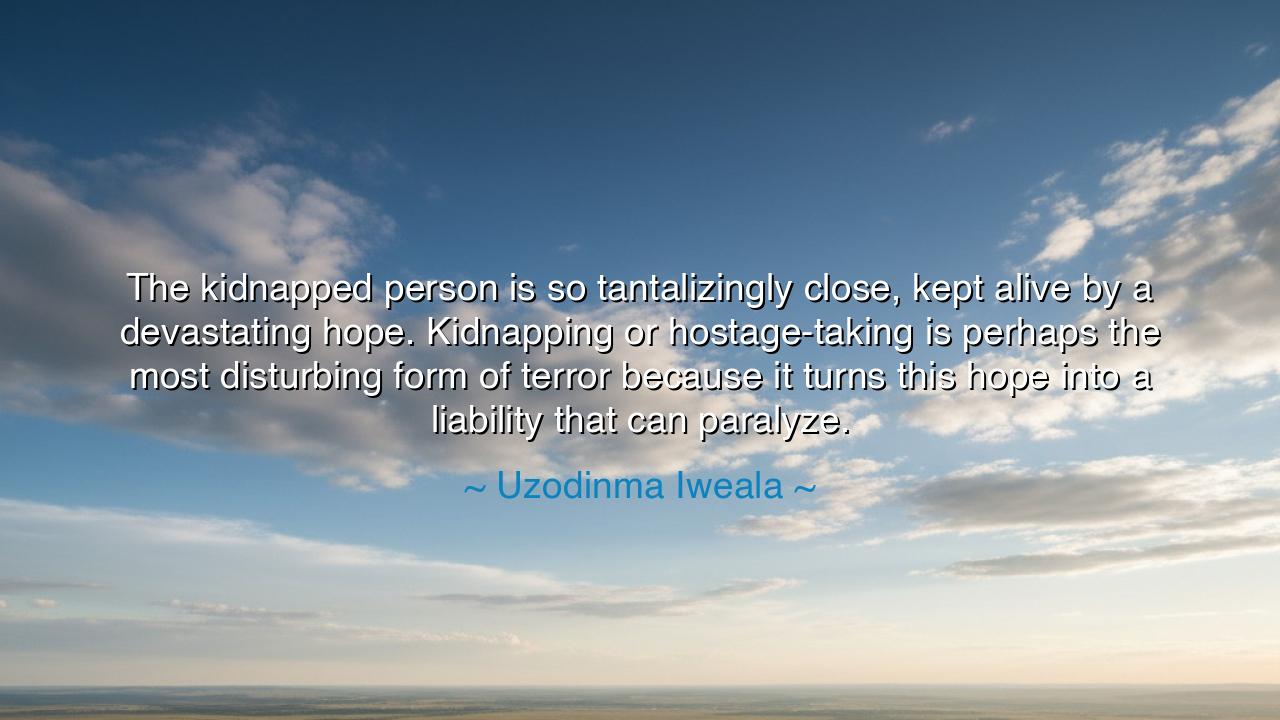
The kidnapped person is so tantalizingly close, kept alive by a
The kidnapped person is so tantalizingly close, kept alive by a devastating hope. Kidnapping or hostage-taking is perhaps the most disturbing form of terror because it turns this hope into a liability that can paralyze.






When Uzodinma Iweala wrote, “The kidnapped person is so tantalizingly close, kept alive by a devastating hope. Kidnapping or hostage-taking is perhaps the most disturbing form of terror because it turns this hope into a liability that can paralyze,” he gave voice to one of the most haunting truths of human endurance. His words pierce beyond the physical act of captivity and touch the soul’s torment—the cruel inversion of hope, that sacred fire meant to sustain us, into a chain that binds the spirit. In this reflection, Iweala captures not only the plight of the captive, but the tragic vulnerability of all who live clinging to the promise of salvation that may never come.
Born from his deep understanding of violence, oppression, and the human psyche, Iweala’s insight arises from the dark soil of reality. A writer and physician, he has studied the wounds of societies broken by war, abduction, and displacement. His novel Beasts of No Nation gave voice to the silenced children of conflict, and his essays continue that same compassionate witness. When he speaks of kidnapping as a unique form of terror, he is not merely describing an event but unveiling a psychological truth: that hope, when manipulated, becomes torment. To the captive, the line between salvation and despair narrows to a knife’s edge; the very thing that once kept them alive begins to consume them.
Hope, in its pure form, is a blessing—it gives strength to the weary and courage to the broken. Yet when it is distorted by cruelty, when it is dangled like a mirage before the desperate, it becomes a poison. The kidnapped soul lives in a space where release seems close—just beyond the next day, the next message, the next negotiation. This nearness is the essence of its agony. Unlike death, which ends suffering, or freedom, which redeems it, captivity sustains suffering by feeding the victim a steady diet of false possibility. It is a terror of suspended life, of breathing yet not living, of waiting for the mercy that never arrives.
History holds many examples of such torment, and none illustrates it more vividly than the story of Patty Hearst, the young woman kidnapped in 1974 by the Symbionese Liberation Army. In her captivity, she was subjected not only to physical confinement but to psychological manipulation so intense that it reshaped her sense of self. Her hope for survival was twisted into submission, her fear weaponized into obedience. She became both victim and unwilling participant in her captors’ cause—a testament to Iweala’s insight that the greatest cruelty of kidnapping lies in how it warps the soul’s relationship with hope. What begins as a lifeline becomes a noose.
Yet this truth extends beyond the literal prison. Many in the modern world are hostages in other forms—enslaved by systems, relationships, or desires that dangle freedom before them but never grant it. We see it in the worker bound to an unending cycle of labor, in the oppressed who are promised change but meet only delay, in the heart that waits endlessly for love that will not return. Each is “kept alive by a devastating hope,” each learning how hope, when detached from action, can paralyze. Iweala’s words, though born from the context of war and terror, echo universally: they remind us that any hope which does not move us toward freedom becomes a silent captivity.
The ancients would have recognized this wisdom. In the myth of Prometheus, chained to a rock for defying the gods, there is the same paradox of endurance and despair. Prometheus cannot die; he can only suffer, his immortality transformed into punishment. He, too, is sustained by a kind of hope—the hope that mankind, for whom he defied Zeus, will one day rise and justify his pain. It is this hope that both sustains and tortures him, just as it does the kidnapped soul. Hope, the noblest of human powers, is also the most dangerous when untempered by truth.
And so, my children of tomorrow, the lesson of Iweala’s words is clear: guard your hope, but never let it become your master. Hope must walk hand in hand with courage and action, lest it turn into paralysis. Do not wait forever for rescue—build the ladder yourself. When you find yourself captive—whether by circumstance, fear, or longing—remember that endurance without purpose is its own prison. Let hope be the light that guides your steps, not the chain that holds you still. For the truest freedom lies not in waiting for salvation, but in daring to create it.
Thus, let us honor Iweala’s wisdom as both warning and call to awakening. There will always be those who seek to weaponize hope, to keep others docile with promises of “soon.” But the wise man and woman learn to see beyond that mirage. Hope, when pure, liberates; when corrupted, it enslaves. The challenge of the spirit, then, is to hold hope as a flame that burns forward—not as a tether that binds us to our pain.






AAdministratorAdministrator
Welcome, honored guests. Please leave a comment, we will respond soon